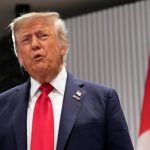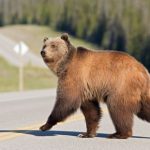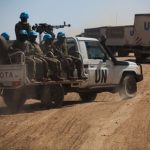UN rapporteur calls for move as food deliveries are attacked and starvation becomes a weapon of war in Gaza and Sudan
UN peacekeepers should be routinely deployed to protect aid convoys from attack in places such as Gaza and Sudan, a seniorUnited Nationsexpert has proposed.
With starvation increasinglyused as a weapon of war, Michael Fakhri said armed UN troops were now required to ensure that food reached vulnerable populations.
“I’m calling for the UN general assembly to authorise peacekeepers to accompany humanitarian convoys,” said the UN’sspecial rapporteur on the right to food.
Fakhri’s call for intervention comes amid deepening concern over the increased targeting of aid convoys inAfricaand the Middle East.
The UN’s human rights office said it was “deeply disturbed” by the rising number of attacks, warning that any attempt to block aid or target humanitarians was a war crime.
Recently, humanitarian convoys have beendeliberately targetedin Central African Republic and also in Haiti in the Caribbean.
Earlier this month, a UN aid convoy of 15 trucks – the first attempt to reach the besieged Sudanese city of El Fasher for a year – wasattacked, killing five people.
The most high-profile obstruction of aid, however, involves the Gaza Strip. Three months ago, Israel imposed a fullhumanitarian blockade on Gaza, cutting off food and other critical supplies to the Palestinian territory. Aid convoys entering Gaza have also been repeatedlyattacked.
Fakhri said that unless there was concerted international intervention to protect aid delivery throughout the world, humanitarian organisations would eventually cease distribution, creating a “dystopia”.
He said the UN security council, whichpassed a resolution in 2018condemning the unlawful denial of aid to civilians, had been rendered ineffective because members kept vetoing attempts to help.
“Where the security council is blocked by a veto, the general assembly has the authority to call for peacekeepers,” said Fakhri.
He said such a move could happen quickly with a majority vote of the 193 member states required – a proportion that Fakhri predicted would easily be reached.
“What the general assembly would do is politically implement what countries are already obliged to do.”
Frustration over the lack of international action to safeguard vital aid supplies – particularly inGaza– has forced activists to take matters into their own hands.
Last week,a yacht attempted to break the Israeli blockadeand deliver aid to Gaza but was prevented by Israel.
On the same day the boat was intercepted, a land aid convoy set off from Tunisia with the similar intention of breaking Israel’s blockade of humanitarian aid for the Palestinian territory.
In Africa, aid delivery in Sudan has becomeincreasingly fraughtas key routes are blocked or attacked while aid facilities and humanitarian workers have been targeted.
Jeremy Laurence, a Geneva-based spokesperson for the UN human rights office, said: “We are deeply disturbed by the intentional obstruction of aid trying to reach civilians from Gaza toSudanand elsewhere, including through attacks on aid convoys.
“Worryingly, these practices appear to be on the increase,” Laurence said. “Wilfully impeding relief supplies to starve civilians as a method of warfare is a war crime.”
Meanwhile,Human Rights Watchdescribed as “horrifying” the spike in the frequency and severity of attacks on humanitarian workers.
Louis Charbonneau, United Nations director at HRW, said:“Last year set a grim record for the number of humanitarian workers killed in conflict zones – more than 360 – most of them in Gaza but also in Sudan, Ukraine and elsewhere.”
Fakhri added: “Whoever controls aid has a significant amount of power in a particular region and conflict.”
He warned that if attacks continued then traditional aid distributors such as the UN could be forced to give up.
“It makes it less likely for the UN, for the international community, for the Red Cross, for civil society organisations, to do that work and then who will take over? These militarised operations seen in Gaza?” he said.
Fakhri was referring to theGaza Humanitarian Foundation(GHF), a US and Israel-backed logistics group that aims to replace Gaza’s UN-led food and humanitarian supply distribution network.
Last Wednesday, Israeli forceskilled at least 60 Palestinians in Gazawho were seeking food from a GHF distribution centre, with dozens more wounded.
Charbonneau urged greater justice for attacks on humanitarians and aid convoys. “One big motivator is impunity, which emboldens the governments of Israel, Russia, the warring parties in Sudan and others to target or fire indiscriminately at civilians, including humanitarian workers,” he said. “The problem is they feel confident they can get away with it.”
Post Views: 146





